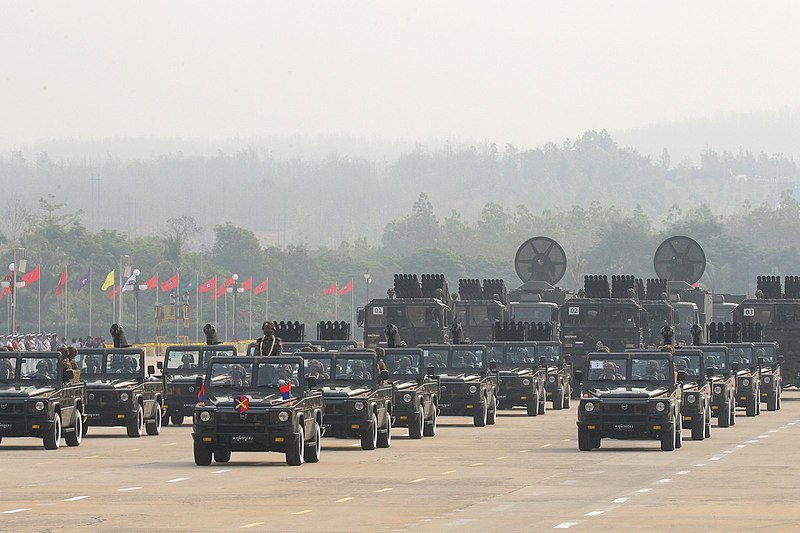A military helicopter in Myanmar attacked a school Monday, leaving six dead and 17 wounded from the assault. This marks the latest violent incident brought on by the military since the generals overthrew Myanmar’s elected government last year in a coup.
According to media reports and residents of Let Yet Kone in the central Saigang region in Myanmar, the military opened fire at a school Friday last week.
At least six children were killed from the strike, and 17 others were wounded. The military said it shot at a school as militant rebels were using the school building to attack.
Reports by the Mizzima and Irrawaddy news outlets said that the military opened fire at a school in a Buddhist monastery in the village. Some children were apparently killed on the spot when the military opened fire, while others were killed when the troops entered the village.
Two residents of the area said the bodies were later brought to a township 11 kilometers away and buried.
The military later issued a statement saying the rebel guerilla groups Kachin Independence Army and People’s Defense Force that the junta calls “terrorists” were hiding in the monastery and used the village to transport weapons in the area.
Myanmar security forces were deployed by helicopter for a surprise raid and were attacked by the guerilla groups in the houses and the monastery.
The military went on to say that some villagers were killed in the clash, and those who were wounded were taken to the hospital for treatment. The military then accused the resistance groups of using the villagers as human shields.
In a statement following the violence that occurred, the country’s shadow government, the National Unity Government, accused the junta of making “targeted” attacks on schools. The NUG also called for the release of 20 students and teachers it said were arrested after the air strikes.
Malaysian foreign minister Saifuddin Abdullah said Monday that the ASEAN regional grouping must decide if they are going to continue with the failed five-point peace plan or go in another direction before the grouping’s leaders meet in November.
“Between now and the ASEAN summit in November, ASEAN must seriously review if the five-point consensus is still relevant and if it should be replaced with something better,” said Saifuddin. “By the time we meet in November, we must ask that hard question and we must have the answer during that time.”



 U.S. to Begin Paying UN Dues as Financial Crisis Spurs Push for Reforms
U.S. to Begin Paying UN Dues as Financial Crisis Spurs Push for Reforms  India–U.S. Interim Trade Pact Cuts Auto Tariffs but Leaves Tesla Out
India–U.S. Interim Trade Pact Cuts Auto Tariffs but Leaves Tesla Out  Trump Says “Very Good Talks” Underway on Russia-Ukraine War as Peace Efforts Continue
Trump Says “Very Good Talks” Underway on Russia-Ukraine War as Peace Efforts Continue  Ohio Man Indicted for Alleged Threat Against Vice President JD Vance, Faces Additional Federal Charges
Ohio Man Indicted for Alleged Threat Against Vice President JD Vance, Faces Additional Federal Charges  Trump Signs Executive Order Threatening 25% Tariffs on Countries Trading With Iran
Trump Signs Executive Order Threatening 25% Tariffs on Countries Trading With Iran  U.S.-India Trade Framework Signals Major Shift in Tariffs, Energy, and Supply Chains
U.S.-India Trade Framework Signals Major Shift in Tariffs, Energy, and Supply Chains  Netanyahu to Meet Trump in Washington as Iran Nuclear Talks Intensify
Netanyahu to Meet Trump in Washington as Iran Nuclear Talks Intensify  Trump Lifts 25% Tariff on Indian Goods in Strategic U.S.–India Trade and Energy Deal
Trump Lifts 25% Tariff on Indian Goods in Strategic U.S.–India Trade and Energy Deal  Pentagon Ends Military Education Programs With Harvard University
Pentagon Ends Military Education Programs With Harvard University  TrumpRx.gov Highlights GLP-1 Drug Discounts but Offers Limited Savings for Most Americans
TrumpRx.gov Highlights GLP-1 Drug Discounts but Offers Limited Savings for Most Americans  Iran–U.S. Nuclear Talks in Oman Face Major Hurdles Amid Rising Regional Tensions
Iran–U.S. Nuclear Talks in Oman Face Major Hurdles Amid Rising Regional Tensions  Federal Judge Restores Funding for Gateway Rail Tunnel Project
Federal Judge Restores Funding for Gateway Rail Tunnel Project  Japan Election 2026: Sanae Takaichi Poised for Landslide Win Despite Record Snowfall
Japan Election 2026: Sanae Takaichi Poised for Landslide Win Despite Record Snowfall  TrumpRx Website Launches to Offer Discounted Prescription Drugs for Cash-Paying Americans
TrumpRx Website Launches to Offer Discounted Prescription Drugs for Cash-Paying Americans  China Warns US Arms Sales to Taiwan Could Disrupt Trump’s Planned Visit
China Warns US Arms Sales to Taiwan Could Disrupt Trump’s Planned Visit  Trump Endorses Japan’s Sanae Takaichi Ahead of Crucial Election Amid Market and China Tensions
Trump Endorses Japan’s Sanae Takaichi Ahead of Crucial Election Amid Market and China Tensions  Jack Lang Resigns as Head of Arab World Institute Amid Epstein Controversy
Jack Lang Resigns as Head of Arab World Institute Amid Epstein Controversy 































